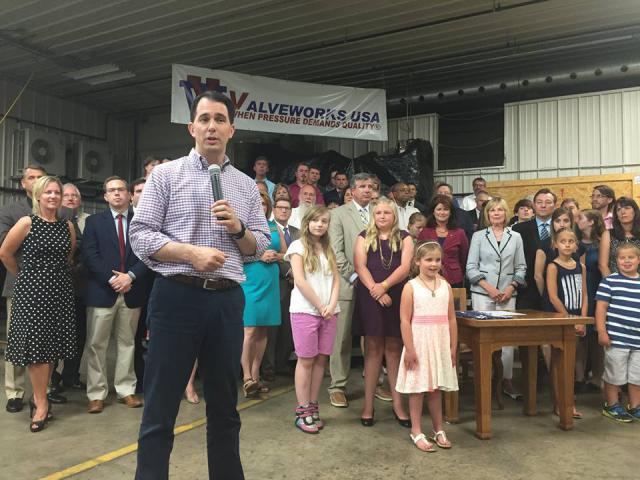Walker Will Unveil A Reelection Budget
Proposals in 2017-2019 budget made with eye to running for a third term.

Governor Scott Walker signs the 2015-17 State Budget into law at Valveworks USA in Waukesha. Photo from the State of Wisconsin.
Governors often say this: You win or lose a campaign for reelection in the year before the actual election.
Which explains the broad reach of proposals in the 2017-19 budget that Republican Gov. Scott Walker gives lawmakers Wednesday: Controlling property taxes on more than 1.4 million homes. Lowering resident undergraduate tuition on UW System campuses. Paying more busing costs for rural schools. Boosting a tax credit that helps low-income workers with one child.
Days after he signs that budget this summer, Walker will formally announce what is widely known: He will seek re-election for a third four-year term in November 2018.
As he drafted his budget proposal, Walker and Republicans who control the Legislature got some good news. The non-partisan Legislative Fiscal Bureau said a combination of higher tax revenues and lower spending means about $714 million more than expected will be available by mid-2019.
That will allow the governor to call for spending $649 million more on K-12 schools, blunting the claims of Democrats who say his past budgets have underfunded those schools. State K-12 aid is now about $5.1 billion per year.
But no package of new help for rural schools would satisfy Democrats, who hope to defeat Walker next year. For example, Democratic Sen. Janet Bewley, from Ashland, said in a statement: “Unfortunately, Gov. Walker’s announcement amounts to a drop in the bucket and pales in comparison to three budgets of school cuts, totaling $1 billion.”
Walker’s package of new help for K-12 and rural schools satisfied another political opponent, Superintendent of Public Instruction Tony Evers, who is seeking re-election in April. The governor’s budget will include more aid for public schools than Evers requested.
Walker also announced changes that his political base of conservative voters will like:
To keep using food stamps, parents must cooperate with officials trying to establish paternity so child-support orders can be enforced. And, the governor wants to require that this “Success Sequence” message be sent to youths: If you graduate high school, get a job and wait until age 21 to marry, you have a ”75% chance of joining the middle class and a 2% chance of being in poverty as an adult.”
But look for Walker to also provide details on other important issues.
*School Choice: Will the governor recommend another expansion of the School Choice program, which costs $244 million this year? Or, will he leave the next expansion up to Republican legislators, including those pushing Education Savings Accounts?
Since Republicans took control of the Capitol in 2010 elections, the number of School Choice students statewide has increased by 60 percent. Republicans expanded Choice to Racine in the 2011-12 school year, and to private schools statewide in 2013-14.
*Controlling property taxes: Fiscal restraints on local governments have allowed Walker to keep his 2010 campaign promise of holding down property taxes on the median-valued home. It’s one promise he won’t break it in the year before he seeks a third term.
The net (after tax credits) property tax bill on that average home was $2,847 in December 2016 – a 3 percent decrease from the bill on that same home in December 2011. That is a statewide average; the bill on your home may have been higher because of school spending referendums or a higher assessment.
*Highway funding: Will the governor rework the state Transportation Department budget announced last year? That budget did not raise the 30.9-cent gas tax or the $75 annual vehicle registration fee, but did borrow $500 million more to continue some major projects. It would delay completion of other major projects for years or even decades.
The entire highway funding controversy spun a new way last week when an audit said DOT had underestimated – by about half – the cost of dozens of projects. For example, that audit warned that 16 major projects initially estimated to cost $2.7 billion will cost more than $5.8 billion.
Veteran Republican Sen. Luther Olsen summarized the new highway-funding dilemma this way: “We will have to deal with that [shortfall] or realize we can only complete about half of the work.”
Steven Walters is a senior producer with the nonprofit public affairs channel WisconsinEye. Contact him at stevenscwalters@gmail.com
The State of Politics
-
RNC Brings Fame to Gen Z Party Leader
 Jul 15th, 2024 by Steven Walters
Jul 15th, 2024 by Steven Walters
-
Wisconsin’s Republican Roots Run Deep
 Jul 8th, 2024 by Steven Walters
Jul 8th, 2024 by Steven Walters
-
Feuding Supreme Court Justices Need a Break
 Jul 1st, 2024 by Steven Walters
Jul 1st, 2024 by Steven Walters






















“Wisconsin’s doing terribly. It’s in turmoil. The roads are a disaster because they don’t have any money to rebuild them. The schools are a disaster. The hospitals and education was a disaster…”
-President Donald J. Trump on Scott Walker in 2016
I don’t like Trump but,he is absolutely correct about Walker. The best thing is to VOTE HIM OUT OF OFFICE.